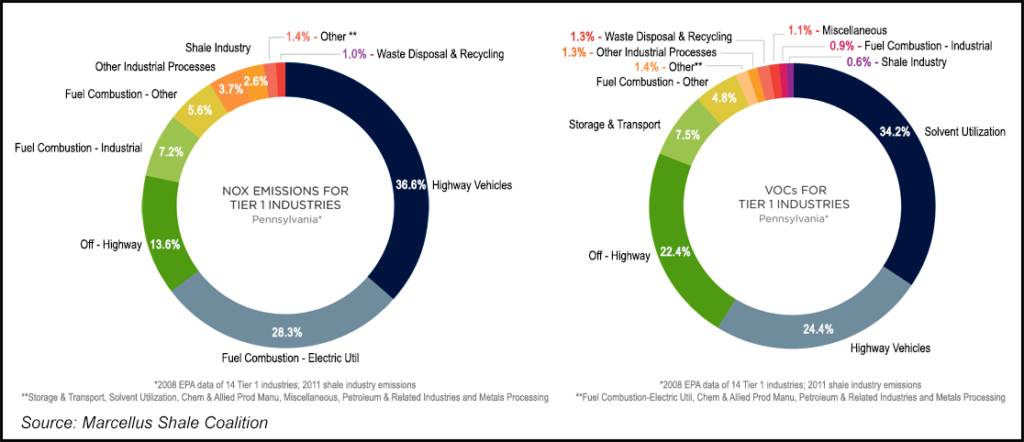NGI Archives | NGI All News Access
Pennsylvania Air Quality Improved Amidst Marcellus Boom
Thanks to Pennsylvania air quality regulations and the “increased use of natural gas in the power generation sector,” Pennsylvania Department of Environmental Protection (DEP) Secretary Mike Krancer said air pollution has “gone down considerably” within the state since 2008, even as the unconventional production of shale oil and gas ramped up.

The DEP this week released emissions data for the unconventional drilling industry, which covered 2011 emissions from natural gas production and processing facilities, such as wells and compressor stations. The state agency said it would discuss the results in more detail on Feb. 21 at 2 p.m. EST in a webcast.
“The data show that emissions from drilling represent a small fraction of air pollution in the state, which has gone down considerably since shale gas development began in earnest several years ago,” Krancer said. “Natural gas is a domestic, abundant, clean-burning fuel source, and we have the regulations in place to assure that air emissions during drilling and transmission do not compromise the environmental benefit of natural gas as a fuel for electricity and transportation.”
The study includes data from 57 operators of unconventional wells and 40 midstream operators of 150 compressor stations. It found that since 2008, air emissions across the state have declined. While unconventional gas production and processing emitted 16,542 tons of nitrogen oxides (NOx) in 2011, emissions of the same pollutant have fallen 43,000 tons per year, the DEP said.
“It is worth noting that annual sulfur dioxide emissions are down more than half a million tons per year from where they were in 2008,” Krancer said. Emissions of fine particulate matter and volatile organic compounds (VOC) are also down, both within the power generation sector and across the state.
Commenting on the DEP’s findings, the Marcellus Shale Coalition (MSC) noted that Marcellus development accounts for less than 3% of NOx and 1% of the total VOCs emitted each year in the Commonwealth.
While acknowledging that these are a small percentage of total emissions, the MSC said gas producers continue to leverage new technologies aimed at further reducing the industry’s environmental footprint. These technologies include the implementation of advanced emissions control equipment at compressor stations, vapor recovery units, the deployment of “green completions” technology, as well as the use of drilling and completion engines fueled by natural gas.
“Our industry is driven by continuous improvement and technological advancements that further reduce the relatively minimal and short-term environmental footprint associated with safe, tightly-regulated natural gas development,” said MSC CEO Kathryn Z. Klaber. “And while these data focus on that small percentage of emissions that come from our operations, the increased use of clean-burning natural gas is proving critical in addressing and achieving improved air quality in Pennsylvania and across the nation.”
Since it began in the previous administration of Gov. Ed Rendell, DEP has conducted a series of air monitoring studies in active shale gas development regions (see Shale Daily, Feb. 2, 2011), which the MSC noted “did not identify concentrations of any compound that would likely trigger air-related health issues associated with Marcellus Shale drilling.” Moreover, the DEP recently announced additional long-term monitoring that currently is underway in Washington County, PA (see Shale Daily, July 25, 2012), which the industry supports.
“We are pleased to see that DEP monitoring data shows that the region’s air quality has remained stable as natural gas development activities have increased,” Klaber added. “While the vast majority of the emissions from EPA [Environmental Protection Agency] Tier 1 industries are ongoing and long-term, the emissions our industry reported to DEP in 2011 — the most active year for Marcellus development — are for the most part short-term in nature and geographically dispersed.”
According to a survey performed by MSC members in 2011, more than 80% of completions were either produced to a pipeline or shut-in while awaiting the installation of a pipeline. The remaining completions were flared, with only one well being vented. MSC said this illustrates that its member companies were in full compliance with EPA’s “reduced emission completions” guidance before the agency mandated the practice last year and set it to go into effect in 2015.
The EPA recently announced that nationwide air emissions are down 8%; and across the Mid-Atlantic region, which includes Marcellus Shale-producing states, emissions are down 13.8%.
Earlier this month, the Pennsylvania DEP finalized revisions to general permits for gas-fired engines and equipment at compressor stations, which are “75-90%” stricter than current limits for the largest, most common types of engines used at compressor stations (see Shale Daily, Feb. 4).
DEP also is suggesting revisions to one section of the air quality permit exemption list governing well drilling sites. The final revised GP-5 permits give operators the ability to install controls to achieve the lower emissions and allow additional types of engines to be used. Operators of facilities permitted by the revised GP-5 would have to demonstrate that the facilities remain “minor sources,” as defined by the U.S. Clean Air Act, which would allow for the operational flexibility.
© 2024 Natural Gas Intelligence. All rights reserved.
ISSN © 2577-9877 | ISSN © 2158-8023 |

